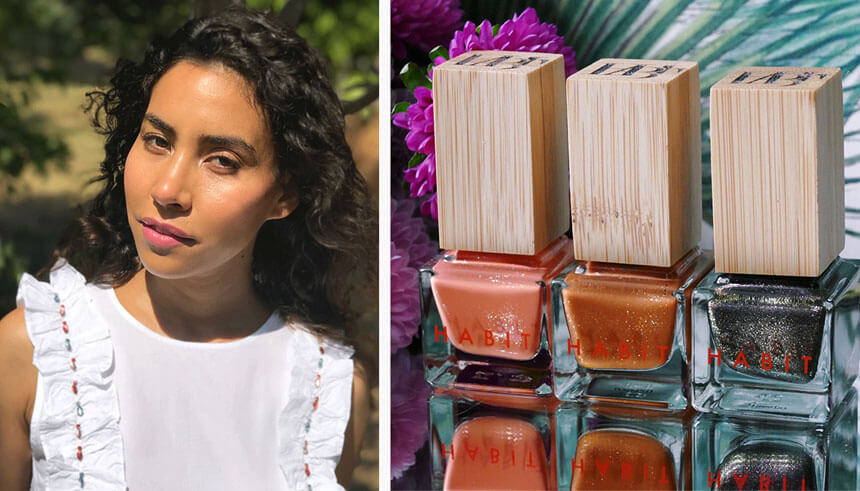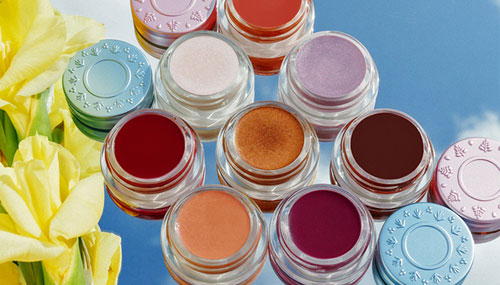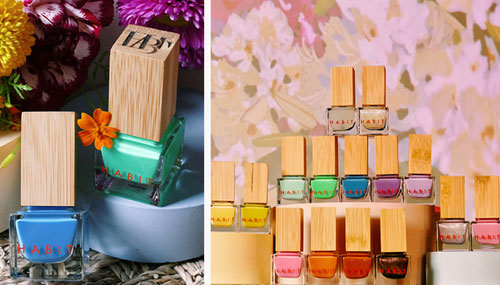Insights
Habit Cosmetics: Scaling a Green Business towards Growth

How an owner of non-toxic organic makeup company built relationships with manufacturers, overcame pandemic hurdles and successfully scaled up business operations.
Ever since Aja Frierson was a young girl watching her mom diligently apply her lipstick in the mirror, she was obsessed with makeup, especially with the way it was used for self-expression and self-care. As a teenager, Frierson became dependent on makeup to cover her acne-troubled skin. It wasn’t until she was in college when she tried different detox diets and discovered that a vegan, minimally processed organic food diet provided some much needed relief to her skin issues. When she wanted to similarly detox her makeup routine, Frierson was hard-pressed to find clean beauty brands that represented women who looked like her.
Fast forward to her first job out of college working as a colorist for a major fashion industry brand, where Frierson learned how to put together color palettes that are trend relevant and wearable on all skin tones.
“That’s when a light bulb went off for me that I could use this new skillset to create color collections and products, and at the same time help all women who want to feel represented and who want to find healing through health-promoting products,” she says. In that moment, Frierson started working on developing a clean cosmetics collection, and that’s how Habit Cosmetics was born.
Since its inception in 2013, Habit Cosmetics has grown to become a successful makeup brand that uses non-toxic, vegan and cruelty-free formulas and sustainable packaging. They deliver high-performance cosmetics that are sold in nearly 100 stores across the country, including Walmart and online. The current collection includes nail polish—the only kind on the market made with recycled plastics components—organic multi-use colors for lips, cheeks and eyes, and organic crème highlighters in reusable aluminum and glass jars.

Since its inception in 2013, Habit Cosmetics has grown to become a successful makeup brand that uses non-toxic, vegan and cruelty-free formulas and sustainable packaging.
Building relationships with manufacturers
While the makeup filling is done in California, Habit Cosmetics relies on their overseas manufacturers for their signature bamboo over caps and other recycled plastic components that are all sourced in China.
“I'm so blessed to be able to work with the manufacturers that I do and lean on their expertise,” Frierson says. “And it really gives me the confidence to know that the formulas that I've created with them are absolutely amazing.”
Despite the recent political climate that created negativity around China, including sourcing from China, Frierson has had only the best experiences working with Chinese manufacturers, although it took time to find and cultivate relationships with the right manufacturers for each makeup component.
“I now work with some of the best manufacturers in business,” she says, “who really went beyond my expectations to make sure that I am happy and who also continuously work with me on different solutions that I haven’t necessarily found elsewhere.”
To entrepreneurs who are considering using overseas manufacturers, Frierson says, “Don't be afraid of sourcing in China. I think there are fabulous partners there that are willing to work with you and help create solutions just for your brand.”
Overcoming hurdles
As a woman entrepreneur of color, getting access to funding has been the biggest hurdle for Frierson, especially in the clean beauty business that Habit Cosmetics operates in. And the statistics, sadly, reflect that. According to Fundera, the U.S. has a total of 12.3 million female-owned businesses that generate $1.8 trillion a year—last year 64% of new women-owned businesses were started by women of color. Despite all that, women-owned startups receive just 7% of venture funds, and female entrepreneurs, on average, ask for roughly $35,000 less in business financing than men and get an average loan size almost $5,000 less than their male counterparts.
Lastly, the global COVID-19 pandemic has had a big impact on small businesses across all industries, forcing many to pivot, shift online or close their operations altogether. The data suggests that smaller businesses have been disproportionately impacted by the pandemic, with about 48% of companies with one to four employees experiencing a significant or severe impact. Habit Cosmetics’ sales took a dip in the beginning of the year when some of their brick-and-mortar retailers closed due to governmental shutdowns. Having a big online presence has helped Habit Cosmetics to keep their head above water and weather through these tough times.
Scaling your growing business with a packaging tweak
Scaling a business is almost always a challenge. Creating a business model that allows your company to generate revenue without adding massive costs along the way requires having the right infrastructure, flexibility and business strategies in place. This is especially true when a small company such as Habit Cosmetics gets a big retailer like Walmart that requires sizeable minimum orders for each type of product.
“Scaling has absolutely been challenging for us, and really up until a couple of years ago, it was really difficult for us for scale,” says Frierson. The reason behind it was that the sustainable components and the assembly process hindered them from producing a large number of units. It wasn’t until Frierson made a packaging change when Habit Cosmetics was able to scale.
Habit Cosmetics has always been intentional about their use of sustainable packaging. At the same time, sustainable packaging is expensive, hard to come by and is not something that many manufacturers are willing with work with. It is especially hard for smaller companies that don’t have sufficient scale and enough financial resources to commit to using this type of consumer packaging.
In the past, everything Habit Cosmetics made was hand-assembled, and their bamboo caps had to be hand-glued to little components.
“I'm so blessed to be able to work with the manufacturers that I do and lean on their expertise. And it really gives me the confidence to know that the formulas that I've created with them are absolutely amazing.”

“It was an absolutely ridiculous process,” Frierson comments. So, she found a manufacturer who was able to produce recycled plastic and re-engineered the caps to be removable. With that change, Frierson was able to completely outsource the assembly to her manufacturers so the products could be shipped directly from the manufacturer to the distribution center and wherever else they need to go.
“It did take some time, and it took some creativity for my manufacturers to figure it out,” she says. “I am really happy with our processes now.”
Having the right financial partner to support your business
“I can’t say enough about Agnes Lew and her team over at East West Bank. They’ve truly gone above and beyond for me in every single way,” says Frierson, who recently became a client of East West Bank. To help offset the effects of the pandemic and maintain cash flow, Frierson applied for a PPP loan, which the bank is currently helping her secure.
“I’ve never had such level of help and personal attention from a bank before and feel like East West is truly invested in my success as an entrepreneur and a business person,” she continues.
What’s next for Habit Cosmetics
At the advice of Agnes Lew, who pitched Frierson the idea of doing a collaboration with contemporary artists, Habit Cosmetics is about to launch 14 new nail polish shades, three of which are co-creations with such up-and-coming artists like Kezia Harrell, Alake Shilling and Lauren Halsey.

“What's really exciting about these new colors that we co-created together is that 40% of the proceeds will be directed toward the causes that each of the artists supports,” says Frierson. For example, Lauren Halsey supports an organization called Downtown Crenshaw, and their mission is to buy back the Baldwin Hills Crenshaw Plaza and to redevelop it for the local community, by the community.
Frierson has been wanting to move her brand into more of a mission-oriented direction for some time now but just wasn’t sure how to do that in an authentic way. Last year, with the rise of social justice movements, she felt that it was time for her brand to start giving back.
“That’s why I am excited about moving forward with this artist collaboration and supporting their causes, and that’s something that I want to continue to do with my brand in the future,” says Frierson.
Subscribe to the Reach Further Newsletter
Get inspiring stories in your inbox every month.

